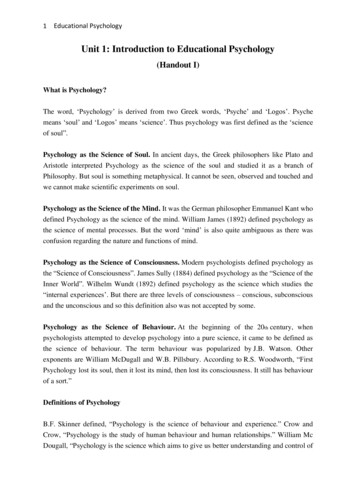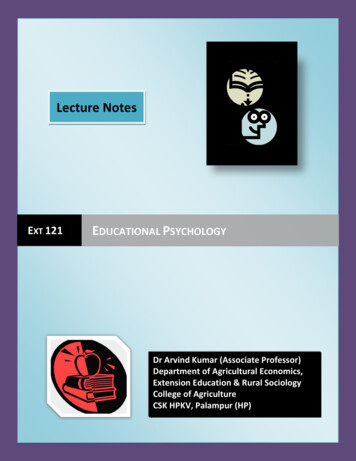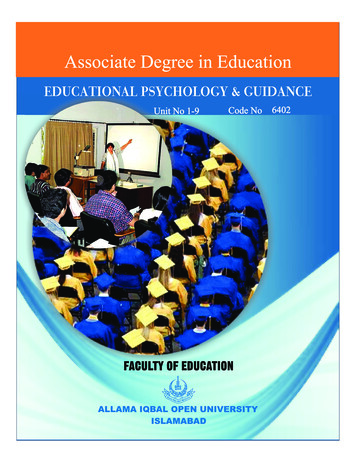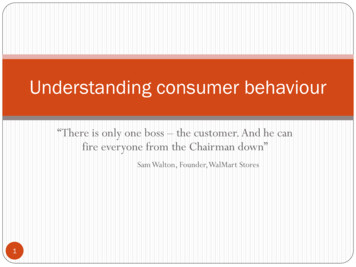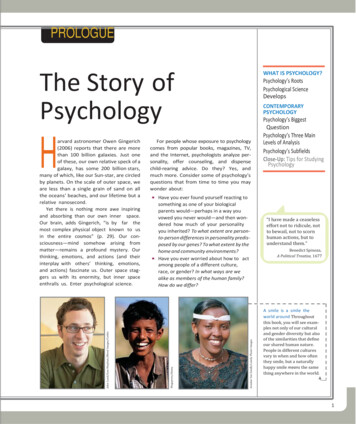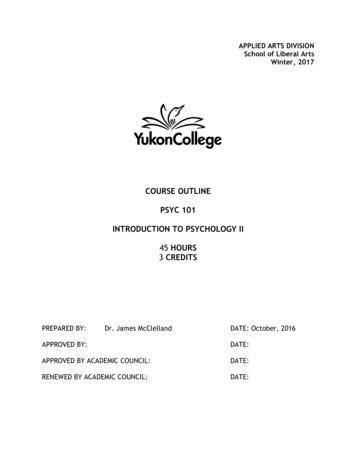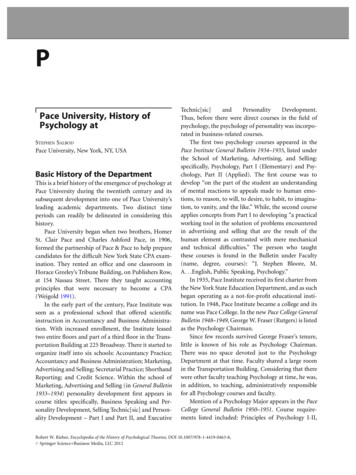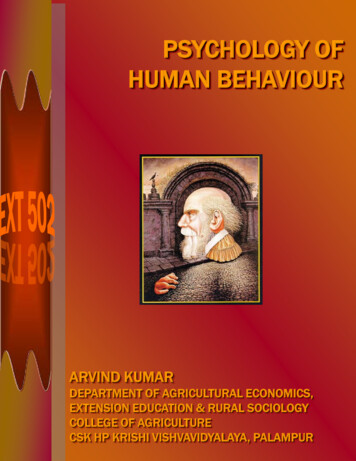
Transcription
PSYCHOLOGY OFHUMAN BEHAVIOURARVIND KUMARDEPARTMENT OF AGRICULTURAL ECONOMICS,EXTENSION EDUCATION & RURAL SOCIOLOGYCOLLEGE OF AGRICULTURECSK HP KRISHI VISHVAVIDYALAYA, PALAMPUR
Go 2 ContentsTABLE OF CONTENTSS No Topic(sTopic(s)Lecture Page1.Psychology: meaning and definitions112.Scope and importance of psychology in extension233.Behaviour and its modification344.Methods of influencing human behaviour474.14.24.34.44.5Compulsion or coercionExchangeAdviceOpenly influencing a farmer’s knowledge level and attitudeManipulation of influencing the farmer’s knowledge level andattitudes without farmer being aware4.6 Providing means4.7 Providing service4.8 Changing the farmer’s social and/ or economic structure5.Perception: concept and laws778891011115-65.1 Nature of perception5.2 Definitions of perception5.3 Laws of perception131314146.Selectivity in perception7207Sensory factors in perception8228.Importance of perception in extension work9249.Attitude: concept and functions10259.19.29.39.4Meaning and definitions of attitudeComponents of attitudesThe A-B RelationshipFunctions of attitudes2526262810.Attitude change113011.Formation of stereotypes and sDefinitionFormation of stereotypesPrejudiceDefinitionFormation of prejudiceMotivation: concept and types12.1 Meaning and definitions12.2 Types of motivation35353536363613383839
13.Theories of low’s hierarchy of needs theoryERG theoryMcClelland’s theory of needTwo-factor theoryThe equity theoryThe expectancy theoryThe reinforcement theoryThe goal setting theory14Techniques of motivating farm people15.Learning: concept and principles4143444546464748175018-195215.1 Definitions of learning15.2 Principles of learning16.Theories of learning525420-2216.1 Pavlov’s classical conditioning16.2 Skinner’s operant conditioning17.Experiential learning17.117.217.317.417.518.23Personality as a set of traits63636366676824-2518.1 Definitions18.2 Determinants of personality18.3 Individual differences19565658Experiential learningExperiential learning cyclesLearning stylesKolb’s learning style: matrix viewKolb’s learning style: descriptionPersonality and individual differences40707071722619.1 Primary traits: sixteen19.2 The Big Five75757620.Personality as the self277821.Roger's self-theory of personality287922.Maslow's self-actualisation theory of personality298123.Emotion: concept and types of emotional response308423.1 Concept23.2 Types23.3 Effect of emotion on rural people24.Theories and role of emotion in regulating human ry theoriesThe James-Lange theoryThe Cannon-Bard theorySchachter and Singer’s Two-Factor TheoryCognitive appraisalProblem-solving8787878888893290
and DefinitionsPSYCHOLOGY:Psychology:MEANINGMeaningAND DEFINITIONS1Psychology has emerged out as a separate subject of study. Prior to this it was considered asa part of philosophy. Psychology is, in effect, child of two parents: philosophy (the pursuit ofwisdom through logical reasoning) and physiology (the study of vital life processes of anorganism such as respiration, digestion, and reproduction). WilheOm Wundt, M. D. (18321920), usually called as father of psychology. He founded psychology laboratory in Germanyand called himself a psychologist.Meaning and definitionsThe term psychology is derived from two Greek words – psyche (soul, or mind) and logos(science or study). Thus literally it means study or science of soul or mind.Till the 16th century, psychology was considered as the science of soul. This definition was rejected as soul was soul considered as a very ambiguous word. There wascontroversy regarding the nature of soul, its location in the body, etc. In the 18th century, psychology was conceived as the science of mind. But difficultyregarding the meaning of mind still persisted. It was considered very doubtful if mind assuch can be studied and which mind? Is it the study of right mind or wrong mind? Therewas no answer to these questions. Later, psychologists considered psychology as the science of consciousness. Thisdefinition was rejected because there are three levels of consciousness – focus ofconsciousness, fringe of consciousness and unconsciousness. Only one level was takeninto consideration. Most contemporary psychologists considered psychology as the science of behaviour oforganism. This includes human behaviour as well as animal behaviour, normalbehaviour and adult behaviour, child behaviour and adult behaviour.Some of the definitions of psychology are presented below: Psychology is the science of the activities of individual in relation to the environment(Woodworth). Psychology is the positive science of behaviour (Watson). Psychology is the science of human behaviour and experience (Cruze). Psychology is the science of mental activity of an organism (Guilford).Course No. Ext 502: Psychology of Human BehaviourGo 2 Contents1
Psychology: Meaning and Definitions2These definitions contain some truth but are not totally correct. A compressive definition ofpsychology is given by Charles E. Skinner. According to him,Psychology deals with the responses to any and every kind of situation that life presents. Byresponses or behaviour is meant all forms of processes, adjustments, activities, andexperiences of the organism.Finally, psychology can be defined as the scientific study of behaviour and mental processes.Key attributes of this definition Scientific study implies carefully controlled observation, description, and experimentalinvestigation to collect information and organising this information. Behaviour broadly refers to all action that can be observed such as physical activity andspeaking as well as mental processes meant to private, cognitive processes that can notbe observed directly such as perceiving, thinking, feeling, motives, remembering, etc.Course No. Ext 502: Psychology of Human BehaviourGo 2 Contents2
Go 2ContentSCOPE AND IMPORTANCE OF PSYCHOLOGYIN EXTENSION1ScopePsychology discovers the general laws that explain the behaviour of living organisms and themost important living organism is human being itself. The individual responds to stimulationand by such responses adjusts to the environment. This continual adjustment constitutes theactivity of the individual during his life time.Psychology is seeking to discover what particular conditions produce a given type of activity,so that eventually the psychologists will be able to control and direct human activity bycontrolling these conditions.Psychology studies the abnormal as well as the normal person. It also attempts to discoverthe source of knowledge, beliefs, and customs and to trace the development of thinking andreasoning, so as to find the kinds of environmental stimulation that produce certain types ofactivity.This knowledge of psychology is useful to extension personnel because it will help them tofind causes of prejudice, the habit of sticking to old practices and ways of doing things, thedoubts, and lack of confidence and factors affecting motivation.ImportanceThe study of psychology helps in identifying:1.The abilities of individual.2.The needs of individual techniques to be employed to motivate them.3.The hereditary and environmental factors that affect behaviour.4.The levels of achievement motivation of the individuals.5.The factors that lead to differential perceptions.6.The causes of emotions and frustrations in human beings.7.The causes of retarded learning.8.The levels of knowledge and attitudes possessed by individuals9.The different psychological traits possessed by individuals.Course No. Ext 502: Psychology of Human BehaviourGo 2 Contents3
Its ModificationBEHAVIOURBehaviourAND ITS andMODIFICATION1There is no single cause of human behaviour. It results from the interplay of diverse factorswhich create a set of circumstances through the dynamic interaction of man and hisenvironment. According to field theory in psychology, the interaction of situational factorswith the perceived environment can be described as a field of forces, a system in tension,or in short, a psychological field. This can be expressed in a formula as follows:b f (P, E sub)Behaviour is a function of the interaction of the individual and his perceived environment. It isnot the totality of factors in his environment that influences his behaviour but only those whichare perceived by the individual.Present information, past experience (past knowledge), and expectations (the anticipation offuture events) contribute to the subjective perception of circumstances. Behaviour can bedescribed as follows.A person (P) in his environment (subjectively perceived environment) feels something is worthstriving for (a target, a desirable state of affaires, an object that is positively desired), and hemobilises his personal powers to reach the goal in question. When something negative orundesirable occurs, he activates his personal powers in the same way to avoid the negativesituation. Ways of reaching targets and avoiding negative situations can be blocked orimpeded by barriers or inhibiting factors (lack of knowledge, uncertainty about consequences,insufficient means, social sanctions, etc).RouteTargetXIndividualBarrierSubjectively perceivedenvironmentFig. 1: Model of the Psychological FieldCourse No. Ext 502: Psychology of Human Behaviour1Go 2 Contents4
and DefinitionsPSYCHOLOGY:Psychology:MEANINGMeaningAND DEFINITIONS1Psychology has emerged out as a separate subject of study. Prior to this it was considered asa part of philosophy. Psychology is, in effect, child of two parents: philosophy (the pursuit ofwisdom through logical reasoning) and physiology (the study of vital life processes of anorganism such as respiration, digestion, and reproduction). Wilhem Wundt, M. D. (18321920), usually called as father of psychology. He founded psychology laboratory in Germanyand called himself a psychologist.Meaning and definitionsThe term psychology is derived from two Greek words – psyche (soul, or mind) and logos(science or study). Thus literally it means study or science of soul or mind.Till the 16th century, psychology was considered as the science of soul. This definition was rejected as soul was soul considered as a very ambiguous word. There wascontroversy regarding the nature of soul, its location in the body, etc. In the 18th century, psychology was conceived as the science of mind. But difficultyregarding the meaning of mind still persisted. It was considered very doubtful if mind assuch can be studied and which mind? Is it the study of right mind or wrong mind? Therewas no answer to these questions. Later, psychologists considered psychology as the science of consciousness. Thisdefinition was rejected because there are three levels of consciousness – focus ofconsciousness, fringe of consciousness and unconsciousness. Only one level was takeninto consideration. Most contemporary psychologists considered psychology as the science of behaviour oforganism. This includes human behaviour as well as animal behaviour, normalbehaviour and adult behaviour, child behaviour and adult behaviour.Some of the definitions of psychology are presented below: Psychology is the science of the activities of individual in relation to the environment(Woodworth). Psychology is the positive science of behaviour (Watson). Psychology is the science of human behaviour and experience (Cruze). Psychology is the science of mental activity of an organism (Guilford).Course No. Ext 502: Psychology of Human BehaviourGo 2 Contents1
Behaviour and Its Modification3Phase 1Phase 2Phase 3Behaviour atdifferent timesInhibiting forcesDriving forcesDisturbance offormer equilibriumShift to newequilibriumStabilisation of modifiedbehaviourPerception ofproblemStages ofachievementSolution to problem orrelapseTimeFig. 2: Model of Behaviour ModificationCourse No. Ext 502: Psychology of Human Behaviour3Go 2 Contents6
MethodsFORfor InfluencingHuman HUMANBehaviourMETHODSINFLUENCINGBEHAVIOUR1Most of the Governments often use policy measures such as laws or subsidies rather thanextension or information programmes for changing the human behaviour or a combination ofthese measures with extension programmes. We need to understand the different methodsthat can be used to influence human behaviour if we want to know when it is feasible ordesirable to use extension. Some of these methods are discussed in this lecture. They are notmutually exclusive. Often they merge one into another. Whether the methods are of one typeor another depends partly on the values of the observer.1) Compulsion or coercionPower is exerted by an authority, forcing somebody to do something. The person applyingcoercive power requires the following conditions: he must have sufficient power; he must know how he can achieve his goals; and he must be able to check whether the person being coerced is behaving in the desiredmanner.Application of coercive power means that the person applying the power is responsible for thebehaviour of the person he is trying to change. It is possible to achieve behaviour change witha large number of people in a relatively short time using this method. However, it can be veryexpensive to maintain and control, and the people being coerced may not always behave asrequired. The method is unsuitable for changing behaviour that requires initiative by thepeople being coerced. Extension may be essential to make the sanctions known, and to try topersuade the people being coerced to follow regulations of their own free will. Manygovernment regulations and laws relating to public health, traffic control, etc. are of this type.Dairy inspectors sometimes have to coerce dairy farmers to follow more hygienic practices intheir milking sheds, using regulations and the threat of fines and other sanctions to achievetheir goals.2) ExchangeGoods or services are exchanged between two individuals or groups. The conditionsnecessary for applying this method are that: each party in the exchange process considers the transaction to be in their favour;Course No. Ext 502: Psychology of Human BehaviourGo 2 Contents7
Methods for Influencing Human Behaviour2 each has the goods or services desired by the other; and each can only deliver his part when the exchange goods or services have beendelivered by the other, or he can trust that this will be done.Exchange is often a very efficient method for meeting the needs and interests of differentgroups, parties, or individuals. However, it is not always efficient or fair. Sometimes the otherparty is inclined to deliver as little as possible of the expected exchange. We see this situationin industrial negotiations between employers and employees, and in trade negotiationsbetween peasant farmers and city merchants. Extension can playa useful role by drawing theattention of a potentially disadvantaged partner in an exchange to ways of preventing theother partner from gaining an unfair advantage. For example, farmers in a remote part of adeveloping country can be given information about the prices paid for the produce in urbanmarkets. They can also be given advice about ways of ensuring fair and legal tradingarrangements with their urban-based trading partners.3) AdviceIt is given on which solution to choose for a certain problem. We can use this method if: the farmer agrees with us about the nature of his problem and the criteria for choosinga 'correct' solution; we know enough about the farmer's situation and have adequate information to solvehis problem in a way that has been tested scientifically or in practice; the farmer is confident that we can and will help him with a solution to his problem; we don't think it necessary or possible for the farmer to solve the problem himself; and the farmer has sufficient means at his disposal to carry out the advice.The adviser is responsible for the quality of his advice. While the adviser's specialisedknowledge may be put to good use, there is usually little development of the farmer's capacityto solve his own problems. Doctor-patient relationships and many advisory situations betweenextension agents and farmers are good examples of this method.4) Openly influencing a farmer's knowledge level and attitudesThis method may be applied when: we believe the farmer cannot solve his own problem because he has insufficient orCourse No. Ext 502: Psychology of Human BehaviourGo 2 Contents8
Methods for Influencing Human Behaviour3incorrect knowledge, and/or because his attitudes do not match his goals; we consider the farmer can solve his own problems if he has more knowledge or haschanged his attitudes; we are prepared to help the farmer collect more and better knowledge and to help himchange his attitudes; we have this knowledge or know how to get it; we can use teaching methods to transmit this knowledge or to influence the farmer'sattitudes; the farmer trusts our expertise and motives, and is prepared to cooperate with us in ourtask of changing his knowledge or attitudes.It is possible to achieve long-term behavioural change using this method. The farmer's selfconfidence and capacity to solve other similar problems in the future by himself is increased.It is a labour intensive method which is often used in extension and education programmes.For example, an extension agent may teach a farmer how to control insect pests in his cropwith the strategic use of pesticide sprays. His first task will be to explain the life cycles of theinsect pest and the crop so that the farmer will understand when each is most vulnerable toattack. If the farmer knows and understands how to use pesticide sprays safely and at themost vulnerable times of the insects' life cycle, he will be in a better position to solve similarproblems in the future. This means he is less likely to ask extension agents for advicewhenever there is an insect problem, but will use his knowledge and experience to solve theproblem himself. It is also possible to try to influence only knowledge level or only attitudes.Most of the conditions we mentioned remain valid in both cases.5) Manipulation or influencing the farmer's knowledge level and attitudes without thefarmer being awareConditions for using this method are: we must believe it is necessary and desirable for the farmer to change his behaviour ina certain direction; we think it is unnecessary or undesirable for him to make independent decisions; we control the techniques to influence farmers without them being aware of it; andCourse No. Ext 502: Psychology of Human BehaviourGo 2 Contents9
Methods for Influencing Human Behaviour4 the farmers do not actively object to being influenced in this way.In this situation the person exerting influence bears responsibility for the consequences of hisactions. At times he may have his own interests in mind, as we find in many commercialadvertising campaigns and in political propaganda. However, it is possible to have the bestinterests of the farmer in mind, as we find in many government sponsored health and safetycampaigns. Dangerous chemicals are widely used in agriculture to control plant diseases andinsect pests. Most farmers would agree it is in their best interests if extension agentsinfluence them to use these chemicals safely and correctly.Extension also has an important role to play in making farmers aware of subtle or hiddenattempts to influence them made by people who stand to gain financially. For this reason theextension services in industrialised countries publish reports on official and impartial tests oftractor and farm machinery performance. Farmers can then check these performancesagainst the claims made by the manufacturers in their advertising campaigns.The methods discussed so far are directed at influencing the farmer himself. Importantchanges can often be achieved by directing influence at the farmer's situation. The nextmethods to be discussed are examples of changes to the farmer's situation.6) Providing MeansWe can apply this method under the following conditions: the farmer is trying to achieve certain goals which we consider to be appropriate; the farmer does not have the means available to achieve these goals, or he does notwish to risk using these means; and we have these means and are prepared to make them available to the farmer on atemporary or permanent basis.Specific means in agriculture include short- and long-term credit for the purchase of land orinputs such as fertilizer, certified seed, sprays, farm machinery, production subsidies, and soon. Correct and timely application of these means, which are usually financed by public funds,may generate large rises in individual farmers' incomes. While this may help distribute wealthmore widely among the population it may also concentrate the wealth among those with thegreatest power or influence in obtaining the means. Costs of providing the means may berecovered through higher taxes on the increased incomes, although there is also the dangerCourse No. Ext 502: Psychology of Human BehaviourGo 2 Contents10
Methods for Influencing Human Behaviour5that loans and other means will not be repaid or replaced in full, thus making them anexpensive form of influence if not carefully controlled and supervised. The 'providing means'approach can be a temporary measure to stimulate farmers to try an innovation.Government departments, including the extension service, use this method for makingfinancial and physical means available. Even if the extension service is not directly involved indistributing credit and inputs, it has an important role to play in drawing farmers' attention tothe availability of these means for improving their situation. Extension agents can also helpfarmers apply for subsidies, credit, etc. and assist them in making decisions regarding whento use these means.7) Providing serviceThis may involve taking over certain tasks from the farmer. The method can be used if: we have the knowledge and/or means available to perform the task better or moreeconomically than the farmer; we agree with the farmer that it is useful to perform these tasks; and we are prepared to perform them for him.Loan and subsidy applications, economic returns for livestock numbers and crop production,and other lengthy forms are an important but time-consuming part of modern farming. Manyfarmers find it difficult and tedious filling out such forms, and often are very pleased to receivefree help and advice from extension agents. However, if free assistance is given indefinitelythe farmer is likely to become dependent and less self-reliant. Clearly, it is in the best publicinterests if he can learn to complete these tasks efficiently himself, or be prepared to payother specialists to help him. The extension agent's role in this situation is to give initial helpor training in how to complete the tasks, or to direct his client to appropriate sources ofprofessional assistance. There are cases where farmers are considered to be incapable oflearning how to perform the task themselves.8) Changing the farmer’s social and/or economic structureMethods for changing the socio-economic structure in rural areas may be important means ofinfluence when: we agree with the farmer about his optimal behaviour; the farmer is not in a position to behave in this way because of barriers in theCourse No. Ext 502: Psychology of Human BehaviourGo 2 Contents11
Methods for Influencing Human Behaviour6economic and/or social structure; we consider changes in this structure to be desirable; we have the freedom to work towards these changes; and we are in a position to do this, either through power or by conviction.Attempts to change social structure will usually be opposed by some individuals or groups,especially when they think these changes will lead to them losing power or income. Farmerswho join together in an association may have sufficient power to overcome this type ofresistance.Extension agents can help farmers understand how economic and social structures influencetheir prospects for making a better living and enjoying a more comfortable style of life. Theycan also help them to explore ways of changing the structures or situations which preventthem from enjoying a better life. Extension agents can help farmers to predict their chances ofsuccess and to foresee possible consequences of any action they may take to change theirsituation, by giving them deeper insight into the social and economic forces that influencethem. Extension and community development workers have helped many poor anddisadvantaged people win a more equitable position in their society by showing them how toparticipate in political processes at the local and national level. Recent programmes of theFood and Agriculture Organization (F AO) of the United Nations have emphasizedparticipation of small farmers, small fishermen, and peasants in training and developmentprojects which help these relatively powerless people to form self-help groups for improveddistribution of inputs and marketing of produce.We have seen that methods of influence vary according to the degree of harmony or conflictof interest between those who influence and those who are influenced, the extent to whichboth parties are aware of any conflict of interest, and the amount of power each possesses. Itis important for the farmer and the extension agent to be aware of their common interests inan extension topic. Each depends on the other, with a change by either one possiblydestroying a mutually beneficial relationship. It is usually easier for the farmer to break thisrelationship as he is not constrained by the same ethical considerations as the extensionagent. However, by virtue of his specialised knowledge the extension agent has a potentialsource of power he could misuse. His hold on farmers could be even stronger where hecombines his advisory activities with supervision of credit, distribution of inputs, enforcementof regulations, etc.12Course No. Ext 502: Psychology of Human BehaviourGo 2 Contents
PerceptionPERCEPTION1Perception refers to the way the world looks, sounds, feels, tastes or smells. It is what isimmediately experienced by a person. From another point of view, perception can be definedin terms of the process giving rise to our immediate experience of the world. Perception cannot be observed directly in behaviour and must be inferred from changes in performance orbehaviour. The famous American psychologist William James has said – “part of what weperceive comes through the senses, from the objects before us, another part . Alwayscomes out of our own head.” This ‘out of the head’ part of the quotation refers to theelaborations, transformations, and combinations of sensory inputs that make our experienceor perception of the world what it is.We receive elementary inputs about the world through our senses and organise the bits andpieces of the input in ways that are advantageous to us in our attempts to deal with the world.The total process of receiving such inputs consists of four phases: stimulation, registration,organisation, and interpretation. Usually, however, it is the last phase which is referred to asperception. The efficacy of facts seems to dwindle progressively as the facts pass through thefour successive phases. You can understand interpersonal situations better if you appreciatehow you and another person construct perceptions.The phase of interpretation or giving meaning to a stimulus is determined by external factors(stimulus characteristics) as well as personal factors such as the perceiver's own needs, priorexperience, mental sets, and emotions. In the context of person perception and socialinteraction, these personal factors operate rather insidiously; they are subliminal in operationand thus stay below one's threshold of consciousness. Perception is the first event in thechain which leads from stimulus to action.Nature of perception1. Perception is a processPerception is essentially a process rather than a product and outcome of somepsychological phenomenon.2. Perception is the information extractorOur sensory receptors are bombarded continuously by various stimuli present in ourenvironment. Perception forms the duty by extracting relevant information.Course No. Ext 502: Psychology of Human BehaviourGo 2 Contents13
Perception23. Perception is preparation to responsePerception is the first step towards active behaviour of an organism. Our sensoryreceptors are just the receiving and transmitting centres of the sensory information.4. Perception involves sensationThe relationships between sensation and perception are directive what we do have insensation is always part of perception.5. Perception provides organisationIn addition to the help provided in deriving meaning to sensory impressions, perceptionalso helps in its proper arrangement and organisation.6. Perception is highly individualisedPerception of one individual differs significantly from another person in the same situation.Different individuals do not perceive objects, events, or relationships in much the sameway. Event individual perceptions of the same event may vary.Definitions of perceptionThe meaning we attach to the raw information received through our senses is calledperception. Alternatively, interpretation of sensory information is perception (Woolfolk, 1995).Perception can be defined as a process by which individuals organise and interpret theirsensory impressions in order to give meaning to their environment (Robbins, 2001).Van den Ban & Hawkins (1988) defined perception as the process by which we receiveinformation or stimuli from our environment and transform it into a psychological awareness.Social perception is the process through which we attempt to understand other persons andourselves (Baron and Byrne, 1993).LAWS OF PERCEPTIONGestaltists concept of perceptionTher
Psychology is the science of the activities of individual in relation to the environment (Woodworth). Psychology is the positive science of behaviour (Watson). Psychology is the science of human behaviour and experience (Cruze). Psychology is
